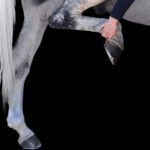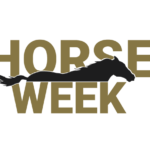September 19, 2002 — I hate to put it in such a cliched way, but this really sums things up: it’s another good news/bad news sort of day at the World Equestrian Games.
All of the Americans are so excited that Peter Wylde is number one in the individual standings with Fein Cera. Remember, I predicted he’d be in the final four (I’m going to keep saying this, because I’m so proud of realizing how well he’d do here, though admittedly, the final four isn’t until Sunday and a lot could happen before then.)
The sad part is that he’s the only American in the list of the top 25 riders who go again on Saturday, and that should give you a hint about the REALLY bad news. After making a strong bid for the bronze medal, the U.S. faded to sixth in the team standings.
Four French men on four French-bred stallions won the gold. Interestingly, Gilles Bertran de Balanda was on the team, just as he was in 1982 when I covered the World Show Jumping Championships in Dublin. It was my first European outing, and I remember well how beautifully the French rode then. They’re still do it the same, lovely classical way, coming in with 13.22 penalties.
Sweden, a surprise to me, was second on 21.02 penalties. I didn’t tip them for a medal because they had lost their best combination, Rolf-Goran Bengtsson and Pialotta, when the mare was sold to an Austrian. But they had enough depth to make that up, and Belgium was third on 22.68.
Royne Zetterman, a member of the Swedish team, said the loss of Pialotta was considered to be very serious.
“We were written off by the press at home as having no chance. But I had a feeling. And the last three times I’ve had this feeling, I won gold, so silver isn’t so bad.”
And the favored Germans? They had to settle for fourth and no medal, with the world’s number one rider, Ludger Beerbaum, getting the drop score in the final round aboard Gladdys S.
There was no doubt that Peter was the real strength of the U.S. squad. He has not dislodged a rail since he’s been here, though he felt his mare, Fein Cera, was getting tired in the afternoon.
“She gave 150 percent today,” said Peter, who’s obviously in love with the bay mare. She might be sold soon to an American for a price of more than $1 million, though he wouldn’t be more specific. But he’s hoping that his performance here with her will find him someone who will buy her and keep him in the saddle.
“We haven’t accepted any deposits,” he explained.
Nicky Shahinian-Simpson had a traumatic first round. Her horse, El Campeon’s Cirka Z, stopped at a fence made of delicate blue planks shaped like waves. I’ve never seen anything like it, and apparently, neither had Cirka Z. He went through the fence and hearing no buzzer, Nicky continued, going on to have a foot in the water and two knockdowns at a double.
But the wave incident should have been called as a refusal, and U.S. Chef d’Equipe Frank Chapot pressed home that point. Apparently, the judges tried to buzz, but the sound system was down. So Nicky got a re-do of the last part of the course. This time she only had a foot in the water, but her 17 penalties were the drop score.
Beezie Madden jumped clean on Judgement, and Leslie Howard had only one rail with Priobert de Kalvarie. America was standing third, and looking good. But that all changed in the second round. Peter was clean and Nicky had four, a good start. Then Beezie had three knockdowns and Leslie, two, ending America’s hopes for a team medal.
“The funny thing about horses is that when it goes wrong, it really goes wrong,” said Leslie with a resigned look. But she is encouraged by the fact that, “We have a chance to win the whole thing with Peter. I’m so thrilled for our country and him.”
I asked Peter to comment on why we couldn’t win that team medal.
“I believe we’re at a disadvantage with the competitions provided to us in our country,” said the former national equitation champion, who lives in Holland and keeps his horses in neighboring Belgium. “We compete in a different type of shows. It’s like the difference between the Grand Slalom and Downhill (skiing) events. I had to come over here to get confidence with this type of format.”
The U.S. has several other medal shots. The team stands first in four-in-hand driving, though not by much, with 72.72 penalties to the Netherlands’ 79.04 and Germany’s 83.36. Ijsbrand Chardon of Holland, a former world champion, holds the individual lead in dressage on 34.08 penalties, to 36.32 for another former world champ, Felix-Marie Brasseur of Belgium. The USA’s Tucker Johnson and Chester Weber are tied for third on 39.36. The marathon Friday could shake things up, however, as we make our final trip of the WEG to Garrapilos.
And then there’s reining, as good a shot for the gold as we have.
After the jumping, I ran into Tom McCutcheon, who won the reining qualifier yesterday and has our gold medal hopes pinned on him in the finals Sunday.
Tom wasn’t wearing a cowboy hat, just a baseball cap, but his cowboy boots and big spurs made him look like he was from a quite a different ballgame than the French gold medalists who rode by us in their elegant red and blue jackets, their tall black boots and small silver spurs gleaming.
Tom is easy to talk to, and I found out he’s been busy watching all the other competitions. It was the first time he had seen eventing, and “it was great,” he said.
I asked, tongue in cheek, if he might try eventing.
“I have enough trouble doing what I do,” he said. NOT!!
He doesn’t like the fact that reining here is called “rodeo.” (Remember, I told you, dressage is “doma” and eventing is “completo.” You will be tested on all this at the end of the WEG.)
“I think that’s kind of a misconception,” he explained. “Someone must not have asked the right people” what to call it.
Oh, earlier today, I had a one-on-one with Dona Pilar de Borbon, the Spanish princess who’s head of the FEI (international equestrian federation.) She’s very nice, and I felt I had to approach her when the FEI offered no specific reason why Aachen, Germany, was chosen over Lexington, KY, to be the scene of the 2006 WEG.
It seems there are a couple of things involved here. First, Aachen had bid twice and Berlin once for the WEG, and each bid was unsuccessful. The FEI didn’t want to discourage such a powerful equestrian nation. And Aachen will get $20 million from the German government, according to the show’s boss, Klaus Pavel, which wants Aachen as the equestrian site for Dusseldorf’s 2012 Olympic bid. The money will go partially toward building a three-day event course within walking distance from Aachen’s stadium, on property leased from the government that is currently used for parking, and also on nearby farmland.
Dona Pilar definitely wants the Kentucky Horse Park to bid on the 2010 WEG, but Horse Park Executive Director John Nicholson says he has a lot of consulting to do back home with various people before a decision is made on that.
When I asked Dona Pilar whether the National Governing Body battle between USA Equestrian and the U.S. Equestrian Team had anything to do with the decision against Kentucky, she said, “Not much. That’s their own problem, they have to solve it; they REALLY have to solve it. The whole community is suffering.”
Amen.





